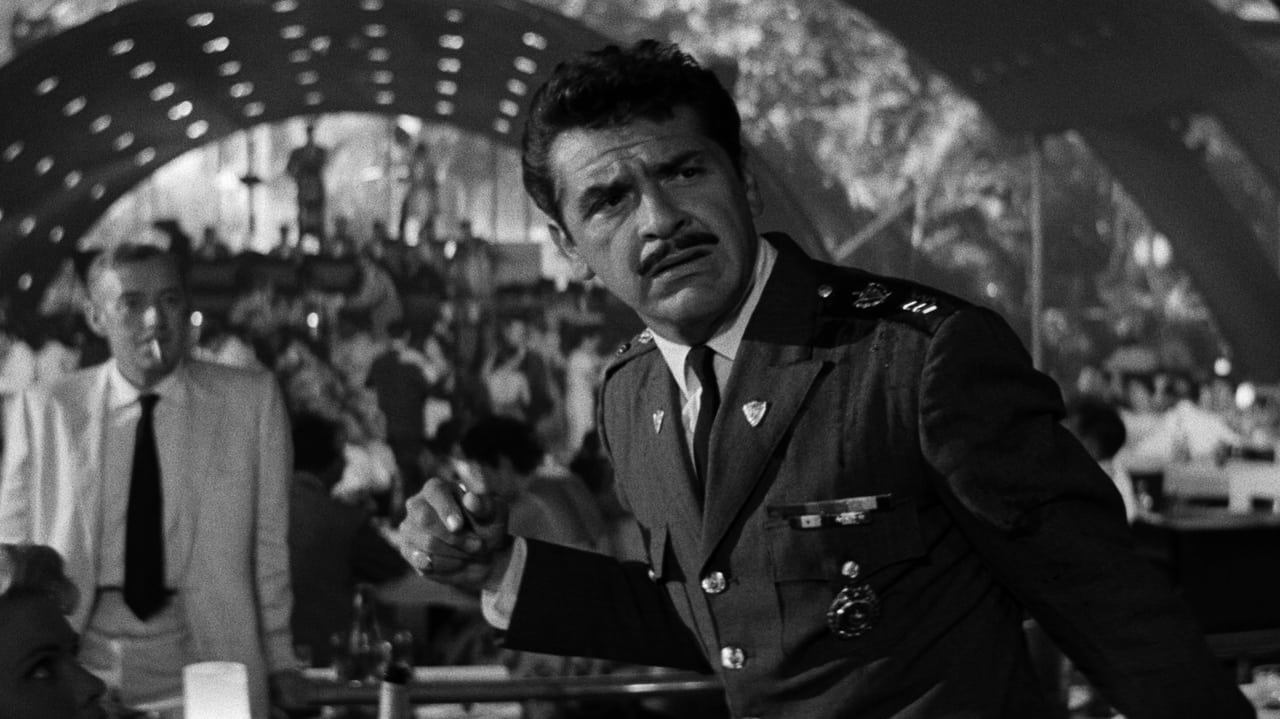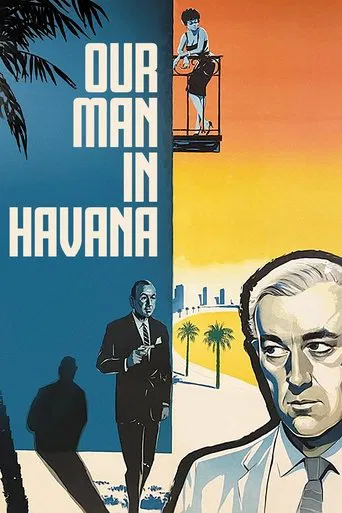RipDelight
This is a tender, generous movie that likes its characters and presents them as real people, full of flaws and strengths.
Rio Hayward
All of these films share one commonality, that being a kind of emotional center that humanizes a cast of monsters.
Beulah Bram
A film of deceptively outspoken contemporary relevance, this is cinema at its most alert, alarming and alive.
Haven Kaycee
It is encouraging that the film ends so strongly.Otherwise, it wouldn't have been a particularly memorable film
Charles Herold (cherold)
Set in Cuba shortly before the revolution (and filmed there after), Our Man in Havana stars Alec Guinness as a man reluctantly persuaded to spy for Britain. He shows no talent for the job, but a considerable talent for making things up.There's a point in the middle of the film, as his lies become amplified by competing factions, that I thought what had been a rather sedate but interesting start was going to move into hilarity. But instead the movie became less comedic after that point. Unfortunate the dramatic elements aren't all that interesting. The movie seems to know that, as it keeps a lot of dramatic threads sketchy. But that just makes the drama weaker; Burl Ives character is never properly explored, and a romance late in the film flowers out of virtually nothing.The movie is well-filmed (at times it's reminiscent in style to director Carol Reed's masterwork The Third Man) and has some good performances (Ernie Kovacs is quite good as a genial yet brutal police captain), but much of it feels like a lost opportunity to push it's brilliant satirical premise to the dark comedy it seems so capable of.
kayaker36
This picture is based on one of Graham Greene's "entertainments" (Greene's term) but is more satire than thriller. However, things do turn dark at the end. Every one of Graham Greene's novels contains a moral dilemma which the protagonist must face. Most also have a fair amount of his (decidedly leftist) political views, for Greene was both a Communist and an Anglo-Catholic. In a few off moments in this film, some these views are expressed but by secondary characters, not by Jim Wermold the protagonist himself. Captain Segura the police chief, played to chilling perfection by Ernie Kovacs, expounds on the "torturable classes" in society, ending with the pronouncement that torture is always "by mutual agreement". {Tell that to the American pilots tortured by the North Vietnamese!] True or not, this is a restatement of Marxist dogma: history as class struggle.Later, Maureen O'Hara as the secretary sent out by Intelligence headquarters in London, on learning that all of Wermold's reports to Home Office were fabrications and that he has taken their money on false pretenses, asks why people must be loyal to countries, anyway and isn't it better just to be loyal to people. This is also is a restatement, this time of a famous quote from E.M. Forster, that if he had to choose between betraying his country and betraying a friend, he hoped he would have to courage to betray his country.While these seemed to be mere philosophical musings in 1958, we know looking back that there was a great deal of active betrayal of Britain and its intelligence services right up to that time by former members of a student group at Cambridge University which did include E.M. Forster--though not Graham Greene, an Oxonian.Perhaps Graham Greene had mixed feelings about Americans but his detestation of the United States was undisguised. He saw America as run by an exploiting Big Business class with the government in Washington a sham, exercising no real power. Any cruelties or injustices practiced in Latin America were naturally attributable to this country and the rapacious businessmen who ran it, in his view. Celebrated for his inventive comedy, Ernie Kovacs played such a convincing Latin that his work here might have led to a second career as a dramatic actor had he not had that fatal traffic accident a few years later.
Robert J. Maxwell
Carol Reed directed some matchless films, "The Third Man" among them. He was capable of clunkers too, like "The Public Eye." This one is somewhere in between but probably closer to "The Third Man." At any rate, it's light years ahead of most of the junk showing up on screens today, though they cost a million times more.Alec Guiness, in a performance both effective and casual, runs a vacuum cleaner shop in Bautista's Havana. He's not doing that well. The palmetto bugs object to the noise. His daughter, Jo Morrow, though is now a budding seventeen-year-old in a convent school and has expensive tastes. And Guiness wants to send her to school in Switzerland, an expensive proposition. In other words, Guiness finds himself in a dilemma common to us non-millionaires, in a vice whose heads consist of expenses and income.But his life changes. He's contacted by the prim, cautious Noel Coward who wants to hire him as a spy for the British Secret Service. Guiness sensibly pooh-poohs the proposition until Coward mentions the salary, at which Guiness gulps and nervously accepts.Coward explains the deal. Guiness will receive his tax-free salary and just "keep an eye on things", sending regular reports to London. He will also have to hire his own agents, who will also receive salaries through Guiness, and who will submit regular reports.A dream come true for the impecunious vacuum shop proprietor. Giddy with delight, he begins making up the names of agents, picking them from phone books and dance hall placards. Pressed for specific information, he draws a picture of one of his vacuum cleaners, claims it is based on the report of one of his agents, that it is a huge installation in the mountains, and sends that in.Regrettably, London takes the report seriously, although Coward remarks tentatively that it looks a little as if it's made up of vacuum cleaner parts. The Chief, Ralph Richardson, admits that it does, but why not build a giant vacuum cleaner as a weapon? The revelation is important enough for London to send an experienced agent and cryptographer, along with staff and equipment, to Havana, where all lodge in Guiness's cramped quarters. His chief assistant is Maureen O'Hara.Somewhere around the point of no return, the story turns rather serious. The Havana constabulary get wind of the operation. And there is "another side" that tries to assassinate Guiness. A couple of deaths, one of them tragic, precede the ironically happy ending.It's usually billed as a comedy and I guess it is, but don't expect to laugh out loud at any of the dialog or scenes. They're smile worthy but low key. A good deal of the humor depends on Guiness's performance and he delivers. But, again, the pace is never frantic. I'll give two examples.When Coward recruits Guiness, he takes him into the men's room of one of the local bars, where he checks for hidden microphones, turns on the taps, and makes Guiness hide in one of the stalls so that, should anyone enter, Coward and Guiness won't be seen together. That's pretty ridiculous in itself, but it gets worse when Guiness tries by himself to recruit an engineer as one of his agents. He approaches the astonished man in the men's room and tries to coax him into one of the stalls while explaining that he'll tell the engineer what to do later. The engineer mistakes Guiness's intentions.The preceding paragraph was a single example of the humor, though it may look like two. Here comes the second example. It's short. Ready? After the story takes a serious turn, Coward invites Guiness to lunch al fresco and tells him matter-of-factly that persons unknown are out to kill him by poisoning him. Guiness is in the middle of slurping a Planter's Punch and does a semi-spit take. Carol Reed frames the shot of Guiness so that he's almost hidden by a bankful of lillies in full bloom. (Kids: Lillies? Funerals?)Oh, well. Let me add that just before this exchange, in a practiced gesture at keeping their conversation hidden, Coward gets up and closes the door between the bar and the tables outside, but the door, like the wall, is nothing more than a few poles of bamboo criss-crossing wide open space.Whether or not it was intended as a comment on Noel Coward's own proclivities, everywhere he goes, dressed like a British gentleman, he's accompanied by an enthusiastic band of mostly young musicians playing guitars and singing, "Donde Va?" Maureen O'Hara is remarkable. She looks magnificent, for one thing. And this is twenty-two years after her film debut. And it's her finest performance, one of the few in which she's cast as something other than a caricature. What a woman.The movie's well worth seeing, keeping in mind that this is not an Ealing comedy or some kind of farce.
Bodine
As suggested by the film's distributor (and at least one reviewer), we watched this movie while drunk. Although more might have been missed than if in a more abstemious condition, a certain spiritual connection was gained. One thing that was not lost; this is one of those films like, say, Chinatown, that requires several viewings to acquire all the layers of nuance. It is, as has been stated by many commentators before, an excellent companion piece to the other Reed/Greene collaborations such as "The Third Man". One of the hallmarks of a great movie is the creation of atmosphere, something this movie has in spades. Dare I say that it would make great double bill with "Beuna Vista Social Club"; if only for a jumping-off point for a discussion comparing pre and post revolution Cuba. This is a film which deserves much more of an audience than it has apparently received and a guaranteed delight for any discerning viewer. Very highly recommended.

